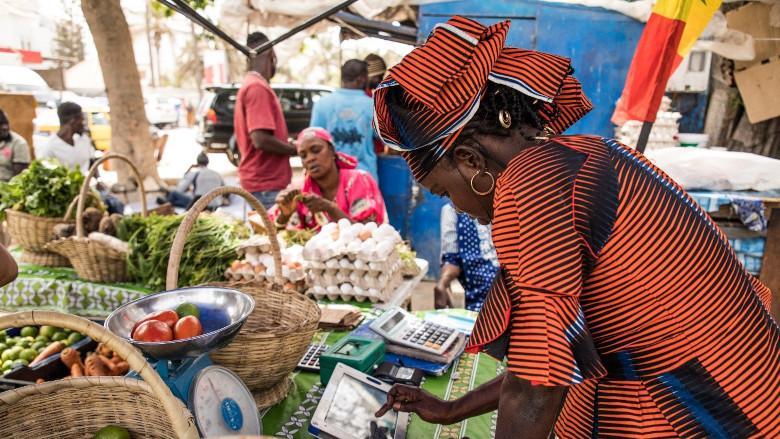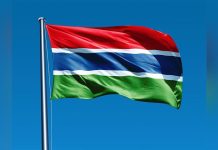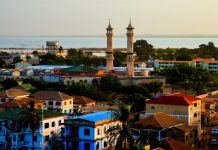Africa-Press – Gambia. It was a moment that would forever change her life. Sitting with her sibling who had recently moved to Côte d’Ivoire, she listened intently as they shared stories of opportunity, growth, and new beginnings.
“It was never in my thoughts that I would ever go to Côte d’Ivoire until one of my brothers came from there to take me,” recalls Madam Rebecca Adebayo, from Ejigbo, Southwest Nigeria, who migrated over five decades ago.
“I just finished modern school and had taken the form for nursing school. My boyfriend later disappointed me, so I went to Ibadan and was doing well selling provisions at Agbeni Market. Then one of my half-brothers came from Côte d’Ivoire and insisted that they should call me back home.”
Hearing about the opportunities in Côte d’Ivoire planted a seed in Madam Rebecca’s heart. It was a chance to start afresh, to build a better life for herself and her family.
That moment when hope met uncertainty became the turning point. She bravely embraced the unknown, her courage shining through as she was convinced that her aspirations could transcend boundaries.
“I was already married with a child, so they begged my husband. I had to sell off all the provisions quickly and pack my things ready for the trip with my child while my husband stayed behind.”
Madam Rebecca would never return to her first husband in Nigeria and had to remarry in Côte d’Ivoire. Now 80 years old, she is one of many Ejigbo women who migrate to Côte d’Ivoire daily.
Decades ago, economic exigencies and limited opportunities pushed many women to seek a better life in Côte d’Ivoire. In recent times, the exodus has persisted, weaving stories of migration into the everyday life of the quiet streets of Ejigbo. Although specific statistics are non-existent, a casual interaction with many Ejigbo people will show that most families in Ejigbo have multiple members in Côte d’Ivoire.
The Osun State official website notes that out of about 1.2 million Nigerians residing in Côte d’Ivoire since the 1900s until the present, indigenes of the Ejigbo local government area made up more than 50%.
Opeyemi Aderanti, Secretary of LABA International Transport, who has been with the company for over six years, confirms that the number of female travellers outweighs that of men.
“Many travellers focus on business, and since women constitute the majority in trade, this may explain why the population of women migrants exceeds that of men. However, we do serve both male and female customers.”
For many, the journey across four nations is a transformative experience, opening doors to fresh opportunities and a brighter future. The trip to Côte d’Ivoire transcends the simple act of crossing borders to become an odyssey through the very essence of West Africa.
These women travel for two to three days through Nigeria, Benin Republic, Togo, Ghana to Côte d’Ivoire.
“When I first approached the Seme border in Lagos, my heart was pounding. I had never crossed an international border before, and the chaos around me was overwhelming,” recalls Sewa Abidoye.
“Crossing into Benin Republic, I felt a rush of relief mixed with apprehension. The language changed, and the environment felt more foreign. I realised I was beginning a journey into unfamiliar physical and emotional territory.”
Sewa was mesmerised by the lush green landscapes and lively market scenes in Togo. The border process was quicker in Ghana where the air was filled with music and energy.
“When I finally arrived at the Côte d’Ivoire border in Noé, I felt both exhausted and excited. I looked around and saw people bustling with purpose and felt a sense of hope.”
But it was a different travel experience when Rebecca embarked on her journey decades ago. She recalls that transportation to Côte d’Ivoire at the time was by ship:
“There were no luxury buses in Ejigbo going to Côte d’Ivoire. When I learnt that we would travel by ship, I was afraid and skeptical about entering it, but I eventually summoned enough courage to board it.”
Salmat Oladeji, who migrated in 1982, shares her own experience of the journey: “Luxury buses plied on the road with the passengers’ loads and luggage all in the vehicle. If the vehicle becomes faulty, it can take six days, a week, or more. It may happen in the middle of nowhere, and there won’t be food or water. Sometimes, we eat only raw pepper with cassava,” she reminisces.
“Now, there are many options for vehicles. The luxury buses take three days to complete the journey, while the small vehicles take two days.”
According to the Migration Data Portal’s regional data overview for West Africa, Côte d’Ivoire constitutes one of the top 10 migration corridors in West Africa and is the number one destination country for migrants within the region.
As of mid-2020, Ivory Coast was home to 2,564,857 migrants, constituting 9.7% of the population. People move within the region partly because of a shared goal to strengthen regional economic ties. This has made it easier for them to travel freely, live, and set up businesses in other ECOWAS countries.
For female migrants, policies such as the ECOWAS Common Approach on Migration (2008) have opened doors to new economic opportunities and personal growth while emphasising gender. Freedom of movement reduces the traditionally faced barriers, such as visa requirements and lengthy border procedures, enabling women to pursue previously inaccessible livelihoods.
Migration history, routes
Olalekan Henry Adebodun, a distinguished researcher in migration, gender studies, diaspora, and sociopolitical history, meticulously traces the roots of the Ejigbo-Cote d’Ivoire migration.
“In the 1900s, two men from Ejigbo town named Alabi Emmanuel and Alhaji Muthahiru Saraki (Lawure) were the first set of people to migrate out of Ejigbo to Abidjan. Their prosperity attracted many from Ejigbo to Abidjan, and the movement has continued to date,” he states.
“The Ejigbo people had long decided to settle in Abidjan (Cote d’Ivoire’s major urban center) for business purposes, and this is what they are known for in Abidjan. Although there are Ejigbo people in other West African countries like Ghana, Togo, Burkina Faso, Liberia, and Benin, to mention a few, it should be noted that those in this category are few.”
According to him, by the early 40s, wider opportunities for business ventures began to attract Ejigbo women to settle in Abidjan.
“This was made possible because, in the early phase of independence for the Ivorians, they had no opportunity to import from their neighbours due to the assimilation policy instilled in them by their colonial masters,” the historian reflects.
“The influx of traders brought in goods from countries they could not import from, which made the transaction easy for Ivorians at this time.”
When asked what makes Côte d’Ivoire (also known as Ivory Coast) stand out among other African countries?
“The favourability of the place. During festive periods in Ejigbo, traders from Abidjan will come home with evidence of good fortune. They would build big houses to live in, or bring along big cars, putting on good clothes. Their contemporaries who migrated to other West African countries will tend to see that Abidjan is a home of fortune for Ejigbo people.”
Life and Trade in Côte d’Ivoire
In Côte d’Ivoire, women from Ejigbo build new lives. Many become traders, integral to local markets and economies. As they advance, they build a network that surpasses cultural divides, sharing resources among themselves, offering advice, and creating growth opportunities.
Madam Rebecca, a resilient entrepreneur, shares her personal experiences, which are a testament to these women’s unwavering determination.
“When I got to Cote d’Ivoire, I was asked to wait for some time before I did anything because I didn’t understand French and could not communicate.”
This language barrier is a common challenge that many Nigerian women who migrate to Côte d’Ivoire face. However, they seek help from family members or other Nigerian women who have already established themselves in the country.
“I told them I could not be sitting at home doing nothing, so I went to one of my aunts from my mother’s side called Ayo Balogun, who gave me 500 CFA, and another one gave me 500 CFA.”
Madam Rebecca started selling bananas, chewing sticks, and other items in front of our house.
“After two years, I could speak their language, and I started buying items in larger quantities and making more profit. I stopped selling bananas, and my new husband gave me some capital to start a business. I don’t remember now, but it was less than ₦1,000.”
“Later, my in-laws told me to join my co-wives in the market, and we are all selling the same thing: cosmetics, baby items, and the like.”
Today, she is a prominent female entrepreneur in Côte d’Ivoire.
According to a local Ivorian business owner named Madame Fatoumata, “Ejigbo women work hard. They bring new ideas and flavours to our markets. Watching them integrate seamlessly while preserving their culture is quite inspiring.”
Alhaji Fatai Atilade Bello Oke, a prominent figure in Ejigbo who was born and bred in Côte d’Ivoire, speaks of the dominance of Ejigbo women in the market. They own most of the major shops, making them the driving force of trade in Abidjan.
“Their influence extends globally, with many travelling to the UK, America, Italy, China, and other countries to import and sell goods in Côte d’Ivoire.”
He also highlights the significant support they provide to their hometown. “Most of the funding, about 70-80%, comes from our people in Côte d’Ivoire. 90% of Côte d’Ivoire’s Ejigbo population regularly send food and other essential items back to Ejigbo.”
Mrs Ifeoma J Akabogu-Chinwuba, a former ambassador to Nigeria in Côte d’Ivoire, notes, “Ejigbo women have played a major role in terms of ensuring peace and harmony among their people in Abidjan, and this was as a result of the special recognition that late President Félix Houphouët-Boigny gave to women in general that they should be respected in the country.”
Sales Assistant Abidoye Sewa migrated to Côte d’Ivoire ten years ago.
“Life in Abidjan is more peaceful. You get value for your money in terms of welfare packages and social amenities, and food is relatively cheap compared to Nigeria,” she shares.
“With a little effort, a quality three-course meal is guaranteed at an affordable price. Distinguishing between the poor and the rich can be challenging, as everyone partakes in fundamental choices.”
Present-day Cultural and Economic Ties
Food is more than just nourishment. It tells the story of who we are as a people and culture. In both Ejigbo and Abidjan, shared food and traditions reflect a long-standing bond between the two places.
Madam Badirat Ayoni, born in Côte d’Ivoire to parents from Ejigbo, embodies this connection. As a second-generation migrant, she has balanced both cultures well.
Source: The Standard Newspaper | Gambia
For More News And Analysis About Gambia Follow Africa-Press






